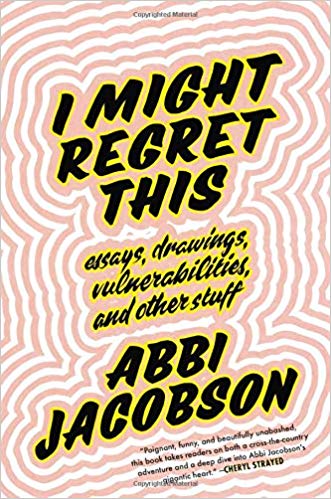
A Road Trip With Broad City’s Abbi Jacobson
The first-person, immediate narrative makes you feel like you’re on the road trip with her if not sharing the same motel bed, given that she gives us a play-by-play of her sleep(less) nights. These chapters, “[City:] Sleep Study,” narrate her readjustments from Marfa to Memphis to Sedona: “Maybe being on my back will be better? Yeah, like a horizontal tree pose.” Likewise, it feels like we are singing in the car with her en route: “Cars are the last spaces we have, our final refuge for belting songs we have no business singing.”
Maybe the best part of the book is how the author sheds the character of the overly-competitive, stoner, straight-laced Abbi we know from Abbi & Ilana. On TV, we follow the duo as they bumble around NYC; this book allows us to see Abbi in a different context: first, outside of New York, and, secondly, alone. “I’m quieter than my character, more shy– an introvert masquerading as an extrovert,” she confesses. Jacobson reflects on the difference between crafting a life for a television series and living one, “More and more [the television series has] become a mirror, reflecting the difference in my own life: the planned and executed process of a television show versus the sprawling, unknown storyline of an effortlessly ravishing, ultra-sophisticated, thirty-three-year old woman.”
Despite the jokes, it’s here where Abbi’s “vulnerabilities” are most acute, and her real personality most visible: “I made a deal with myself around the time I turned thirty, years before this last relationship, to try and live my life without needing anyone else.” There’s a moment when Abbi FaceTimes Ilana to share how she’s lonely; Ilana is in the cab with her husband about to go to Europe, and Abbi ends up not fully disclosing her worries to her creative partner, instead sharing them with the reader. The vignette vibrated with resonance for me: swapping stories as a way to preserve a friendship, while keeping the real emotions internal, a gesture of self-reliance.
On her leg from Asheville, North Carolina to Memphis, Tennessee, she asks “The Big Questions,” which vacillate from silly to serious: “Is there a point in time when you stop feeling like you’re eighteen?” to “Why does the sight of the person you’re in love with, wearing your clothes, feel so deeply good?” Abbi’s flippant humor in the context of the liminal space of a road trip, temper heaviness around early-30s life choices and the social construction of “adulthood.” In an essay called “Minor Regrets,” Jacobson admits that her “Jewish education feels half-assed.” She is honest, forthright, and, of course, humorous, about what it means to be a woman in media. “Like most adult scenarios, everything is high school all over again.”
Her drawings and doodles create a sort of Rookie-Magazine-style life syllabus. We are given access to Abbi’s media consumption: books (Joan Didion, Susan Sontag, Alan Watts), playlists (Beth Ditto, Sharon Jones, Marquee Moon, Phish, Prince, Kendrick Lamar, Aimee Mann, Angel Olsen, Nick Cave, Courtney Barnett, Sia, Talking Heads), podcasts (The Daily, How I Built This, Where Should We Begin with Esther Perel) and binging Netflix sessions (entirely West Wing). And her snack consumption: Topo Chico, turkey jerky, RX bars, apples.
The book ends (though not before an essay titled “Best Bagels” unpacks Jacobson’s crumbled past of bagel shops she’s frequented) in Palm Springs, where Abbi imagines herself as the 60-year old woman swimming laps in the middle of the Ace Hotel on one of the hottest days of the summer. She looks at the woman, reflecting on the life she has lived: one that is creatively fulfilled, shared with someone, full of joy, adventure, and love. Maybe it’s the role of me, the reader, to turn Abbi’s head so she is angled from lone observer to narrator, and allow her to see what I see plainly: Jacobson’s life, as expressed on this road trip, is clearly already that.



